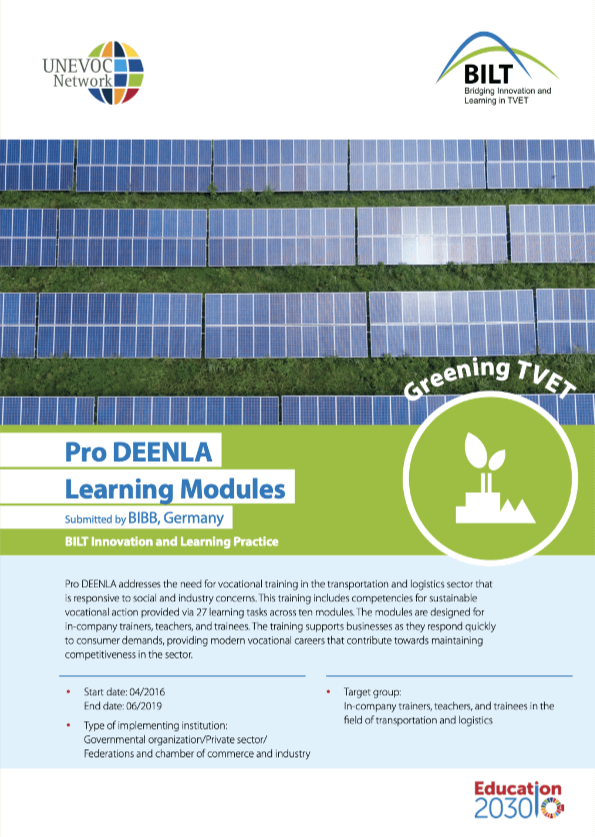About BILT: Our approach | Themes | Who we are
Get involved: News and events | BILT community | Expert group | Self-Reflection Tool
Knowledge base: Innovative and promising practices | Atlas of emerging trends | BILT library | TVETipedia

AdobeStock_170379794
Environmental sustainability has evolved as a standard benchmark in the regions addressed by the BILT project including Europe, Africa and Asia-Pacific as well as worldwide. Adverse climate change impacts and depletion of finite natural resources require fundamental changes across all levels of society and economy.
However, sustainable economic growth, as outlined in the 2030 Agenda for Sustainable Development, can only be achieved when the world of work can effectively transition towards greener and sustainable practices. The education and training systems need to be prepared to respond to such ambition. In this context, TVET is expected to play a key role in equipping learners for the emerging green jobs and providing them with green competencies that can enable them to adapt to changing work processes and profiles.
There is often a mismatch between the skills needed to effectively function in the transition to a green economy and society, and the ways in which they are developed through the existing teaching and training contents. The adoption of green innovation in school and in the workplace, and green skills development go hand in hand, so TVET systems must find efficient ways to determine the new green qualifications and competencies that are needed, to adopt approaches to embed them into curricula, and to put these competencies into practice.
The UNESCO Strategy for TVET 2022 - 2029 pays attention to the critical importance of developing the skills needed for inclusive and sustainable economies, which is the bedrock to advance the agenda for greening TVET and promoting education for sustainable development (ESD).
Whilst the challenges of climate change are shared by the global community, countries struggle with different local conditions. Notably, countries of the Global South shoulder the burden of having to deal with the devastating impact of climate change, including biodiversity loss, global warming, drought, extreme weather conditions to name a few.
1,2 billion jobs (40% of the global workforce) depend on healthy ecosystems and a stable environment.
ILO, 2022Climate change and the protection of the environment were the top personal concern of Generation Z in 2021.
Deloitte, 2021An additional 8.4 million jobs could be created for young people aged 15-29 by 2030 as a result of the green transition.
ILO, 2022BILT starts from the assumption that the transition towards a green economy is closely intertwined with other major challenges, including the COVID-19 pandemic and the ongoing digitalization of the world of work.
Consequently, the BILT project looks at how greening is influenced by other trends, in particular the digital transformation, and puts a special focus on the dual transition of greening and digitalization.
Through its various activities, BILT seeks to contribute to making TVET greener by addressing the most critical points of entry to learning across different best practice examples, sharing knowledge and compiling and disseminating information about transferable innovations in TVET. This includes the organization of bridging events fostering peer learning among TVET stakeholders and the work of expert groups on the dual transition with a particular focus on key economic sectors of construction, and tourism and hospitality.

The 'New qualifications and competencies for future-oriented TVET' publication written by the BILT expert group focuses on how green and other competencies can be identified, integrated into curricula, and implemented into TVET practice.
Go to Library
Artwork by Milestone-Belanova
Working to not only develop ESD in the curricula, but also to infuse sustainable practices into every action people take in their TVET communities is essential. BILT regularly documents and showcases Innovation and Learning Practices that demonstrate how the greening of TVET is implemented in Europe, Africa and Asia-Pacific.
Providing spaces for youth and entrepreneurs to share new and successful concepts with the TVET community is essential for green innovation to flourish. The BILT Learning Labs series spotlights different TVET projects that are selected as Innovation and Learning Practices. The 2022 Learning Lab on the Gearbox makerspace and product development provided the stage for a practical example about how affordable construction materials can be produced from waste products.

Innovation and Learning Practice 'Pro-Deenla Learning Modules' aims to enhance sustainability approaches in the logistics sector. Modules for trainers and trainees are freely available in English.
DownloadThe BILT project is implemented by
with support of
and sponsored by